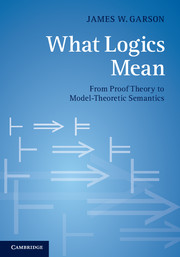Book contents
- Frontmatter
- Dedication
- Contents
- Preface
- Acknowledgements
- 1 Introduction to model-theoretic inferentialism
- 2 Deductive expression
- 3 Local expression
- 4 Global expression
- 5 Intuitionistic semantics
- 6 Conditionals
- 7 Disjunction
- 8 Negation
- 9 Supervaluations and natural semantics
- 10 Natural semantics for an open future
- 11 The expressive power of sequent calculi
- 12 Soundness and completeness for natural semantics
- 13 Connections with proof-theoretic semantics
- 14 Quantifiers
- 15 The natural semantics of vagueness (with Joshua D. K. Brown)
- 16 Modal logic
- Summary
- References
- Index
4 - Global expression
Published online by Cambridge University Press: 05 June 2014
- Frontmatter
- Dedication
- Contents
- Preface
- Acknowledgements
- 1 Introduction to model-theoretic inferentialism
- 2 Deductive expression
- 3 Local expression
- 4 Global expression
- 5 Intuitionistic semantics
- 6 Conditionals
- 7 Disjunction
- 8 Negation
- 9 Supervaluations and natural semantics
- 10 Natural semantics for an open future
- 11 The expressive power of sequent calculi
- 12 Soundness and completeness for natural semantics
- 13 Connections with proof-theoretic semantics
- 14 Quantifiers
- 15 The natural semantics of vagueness (with Joshua D. K. Brown)
- 16 Modal logic
- Summary
- References
- Index
Summary
Of the accounts of expressive power examined so far, one definition is too weak and the other too strong. The Deductive Expression Theorem of Section 2.2 showed that indeterminacy of connective meaning affects all symbols other than & and ⊥ when deductive expression is chosen as the criterion for what rules express. However, when local expression is chosen in its place, the Local Expression Theorem of Section 3.3 applies, and so natural deduction rules determine classical interpretations of all the connectives. Unfortunately, this has the bizarre consequence that systems of rules locally express semantical conditions for which they are incomplete. Furthermore, the use of local expression is simply incompatible with predicate logic or modal logic, and it flies in the face of the fact that it is validity, not satisfaction, that serves as our criterion for the correctness of arguments. (See the objections discussed in Section 3.5.)
In this chapter, we will define global expression, the notion of expression that gets it just right. It is neither too strong nor too weak, and it fits nicely with an interest in systems stronger than propositional logic. Here preservation of validity is taken as the appropriate benchmark for what counts as a model of a rule. Therefore system S globally expresses property P of models iff for every model V, the rules of S preserve V-validity exactly when V obeys P. The interesting thing about global expression is that natural deduction (ND) rules express intuitionistic truth conditions. The present chapter will set the stage for discussing these results by defining global expression and exploring its features. We will first show (Section 4.1) that the natural deduction rules for & and ⊥ globally express the standard interpretations for & and ⊥. In Section 4.2, we will define and explore the notion of a natural semantics for a system of rules S, that is, a condition on models that is globally expressed by S, and that provides a recursive account of the truth behavior of the connectives that S regulates. After that, it will be shown (Section 4.4) that the natural semantics for the natural deduction systems regulating →, ↔, and ∨ is not classical, by exploiting results in Section 4.3 concerning what is called the canonical model.
- Type
- Chapter
- Information
- What Logics MeanFrom Proof Theory to Model-Theoretic Semantics, pp. 46 - 56Publisher: Cambridge University PressPrint publication year: 2013



